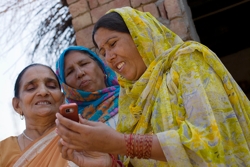This post was originally published on the Smart Global Health Blog.
Secretary Clinton’s inspiring piece on how the interests of the U.S. and India are aligned on issue after issue (India and the United States: A Focus on the Fundamentals) compelled me to articulate one more way in which the world’s two biggest democracies could pave the way for international co-operation. This is a remarkable opportunity for the U.S. and India to join together in addressing NCDs, chronic non-communicable diseases. NCDs, including diseases like heart disease, diabetes, cancer and chronic lung diseases, kill about 2 out of 3 people in the world, affecting people in both developed and developing countries though they kill more people in poor countries, and impact the poor the most.
At last year’s UN High Level Meeting on NCDs, leaders from the United Nations, the U.S., India and the rest of the world, unanimously acknowledged NCDs as one of the greatest health and development challenges of the century. The Political Declaration they adopted that day recognized the enormous burden of these diseases on economies and societies, and called for a whole-of-government and whole-of-society approach to tackle NCDs. At the World Health Assembly last month, member states agreed to an exciting and noteworthy goal – that of reducing mortality from NCDs by 25% by 2025. The U.S. and India could take the lead and show the world how countries can reach the 25 by 25 goal.
Both the U.S. and India are affected by NCDs. India is home to 50 million people with diabetes, and the International Diabetes Federation predicts that this number will reach 87 million by 2030. According to the CDC, the U.S. is home to approximately 25 million people with diabetes – about 8% of the population. Heart disease and cancer are the top two causes of death in the U.S., and cancer is expected to claim the lives of more than 1,500 Americans a day in 2012.
Prevention is key. According to the World Health Organization, 80% of heart disease, 80% of type II diabetes and 40% of cancers are preventable by avoiding tobacco use, eating healthy foods and increasing physical activity. And, we have great models to emulate. We can learn from New York City’s bold ad campaigns and efforts to reduce smoking and sugary drinks consumption, their use of legislation to reduce transfats in restaurants, and their innovative use of public spaces to encourage walking and biking safely. We can support Lets Move, and the First Lady’s incredible effort to encourage healthy eating and increase physical activity among school children.

The mDiabetes initiative plans to reach 1 million people in India with text messages about diabetes prevention. Photo courtesy of Nokia.
For our part, Arogya World is implementing the mDiabetes text messaging program in India. Using the Nokia Life platform, we’re working to reach 1 million people with text messages (developed with Emory University) about diabetes and its prevention in 12 languages. The program is ongoing and we are spending a lot of energy and resources on measurement and evaluation. If found effective, text messaging may become an easy, scalable way to persuade large numbers of people to take up exercise and eat healthier foods in order to prevent diabetes in India, the U.S., and around the world. India is becoming a much-watched center of innovation in healthcare delivery and low-cost, high-quality healthcare is already being delivered to large numbers of people in a sustainable way. And the U.S. is legendary for its innovation and entrepreneurial spirit. Both countries have the bold leadership and technology advances needed, and both countries consider the pursuit of healthy living a worthy aspiration and believe fully in the power of innovation – these are what it will take to tackle NCDs.
It is my fervent wish that my country of today and the country of my birth will lead the world in NCD prevention. NCDs are changing the face of global health as we know it, and will define our generation and our legacy, and the world we leave behind.
